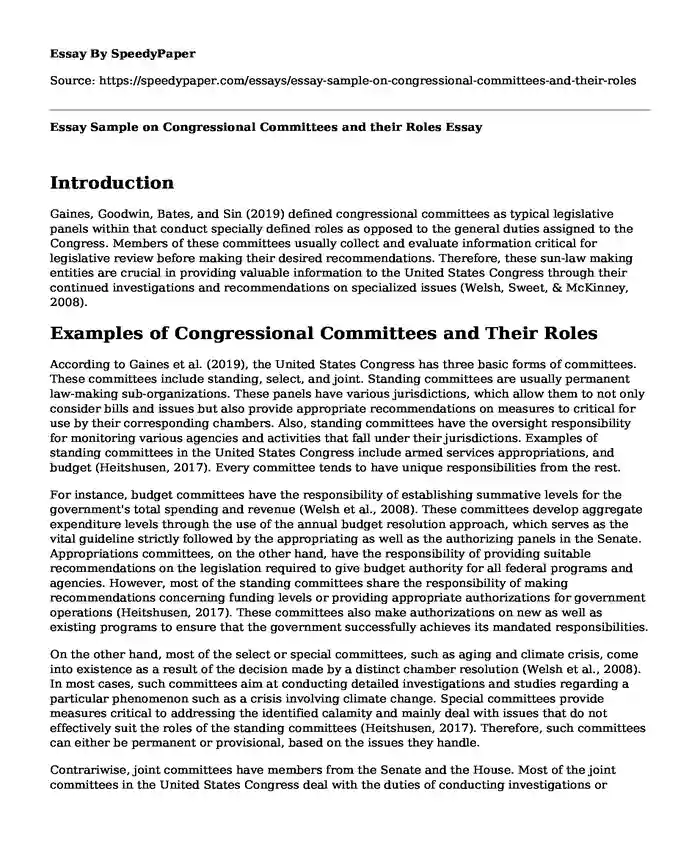
| Type of paper: | Essay |
| Categories: | Government |
| Pages: | 3 |
| Wordcount: | 700 words |
Introduction
Gaines, Goodwin, Bates, and Sin (2019) defined congressional committees as typical legislative panels within that conduct specially defined roles as opposed to the general duties assigned to the Congress. Members of these committees usually collect and evaluate information critical for legislative review before making their desired recommendations. Therefore, these sun-law making entities are crucial in providing valuable information to the United States Congress through their continued investigations and recommendations on specialized issues (Welsh, Sweet, & McKinney, 2008).
Examples of Congressional Committees and Their Roles
According to Gaines et al. (2019), the United States Congress has three basic forms of committees. These committees include standing, select, and joint. Standing committees are usually permanent law-making sub-organizations. These panels have various jurisdictions, which allow them to not only consider bills and issues but also provide appropriate recommendations on measures to critical for use by their corresponding chambers. Also, standing committees have the oversight responsibility for monitoring various agencies and activities that fall under their jurisdictions. Examples of standing committees in the United States Congress include armed services appropriations, and budget (Heitshusen, 2017). Every committee tends to have unique responsibilities from the rest.
For instance, budget committees have the responsibility of establishing summative levels for the government's total spending and revenue (Welsh et al., 2008). These committees develop aggregate expenditure levels through the use of the annual budget resolution approach, which serves as the vital guideline strictly followed by the appropriating as well as the authorizing panels in the Senate. Appropriations committees, on the other hand, have the responsibility of providing suitable recommendations on the legislation required to give budget authority for all federal programs and agencies. However, most of the standing committees share the responsibility of making recommendations concerning funding levels or providing appropriate authorizations for government operations (Heitshusen, 2017). These committees also make authorizations on new as well as existing programs to ensure that the government successfully achieves its mandated responsibilities.
On the other hand, most of the select or special committees, such as aging and climate crisis, come into existence as a result of the decision made by a distinct chamber resolution (Welsh et al., 2008). In most cases, such committees aim at conducting detailed investigations and studies regarding a particular phenomenon such as a crisis involving climate change. Special committees provide measures critical to addressing the identified calamity and mainly deal with issues that do not effectively suit the roles of the standing committees (Heitshusen, 2017). Therefore, such committees can either be permanent or provisional, based on the issues they handle.
Contrariwise, joint committees have members from the Senate and the House. Most of the joint committees in the United States Congress deal with the duties of conducting investigations or executing housekeeping duties as opposed to providing recommendations on the functioning of the federal government (Gaines et al., 2019). For instance, the Joint Committee on Printing has the overall responsibility of overseeing the effecting functioning of the government's publishing office. The leadership of such panels also alternate between the Senate and the House. The constitution allows for the formation of a conference committee to help in resolving any form of conflict between members of the joint committee (Welsh et al., 2008). However, addressing such disputes entails receiving approval from the Senate after discussing the issue in question in Congress.
Conclusion
The effective functioning of the United States Congress relies exclusively on its committees. These committees enable their members to gain specialized skills and knowledge regarding different issues under their jurisdiction. The committees also play a significant role in the monitoring of governmental activities and diagnosing and identifying matters that require legislative review. Also, the Congressional Committees provide appropriate recommendations for improved governance, as discussed in this paper.
References
Gaines, B. J., Goodwin, M., Bates, S. H., & Sin, G. (2019). The study of legislative committees. The Journal of Legislative Studies, 25(3), 331-339. Retrieved from https://www.tandfonline.com/doi/full/10.1080/13572334.2019.1662614.
Heitshusen, V. (2017 May). Committee types and roles. Congressional Research Service. Retrieved from https://www.senate.gov/CRSpubs/312b4df4-9797-41bf-b623-a8087cc91d74.pdf.
Welsh, M., Sweet, E., & McKinney, R. (2008 July). An overview of the development of U.S. Congressional Committees. [Online]. Retrieved from https://pdfs.semanticscholar.org/8dbf/1a2cf55ced0800ca17d86cfffbee593d599d.pdf.
Cite this page
Essay Sample on Congressional Committees and their Roles. (2023, Mar 02). Retrieved from https://speedypaper.net/essays/essay-sample-on-congressional-committees-and-their-roles
Request Removal
If you are the original author of this essay and no longer wish to have it published on the SpeedyPaper website, please click below to request its removal:
- Argumentative Essay Example: The Number of Rental Mopeds Should Be Limited
- My Life Story - Free Essay on Personal Experience
- Free Essay: Philosophy Regarding Children and Learning
- Essay Example on Designing Modern Transport System Friendly to Pedestrian
- Should Slavery Be Abolished in the Antebellum South? Essay Sample
- MESPON 2018: Essay Example about the Conference
- Essay Sample on Borderline Personality Disorders and Executive Functions
Popular categories




